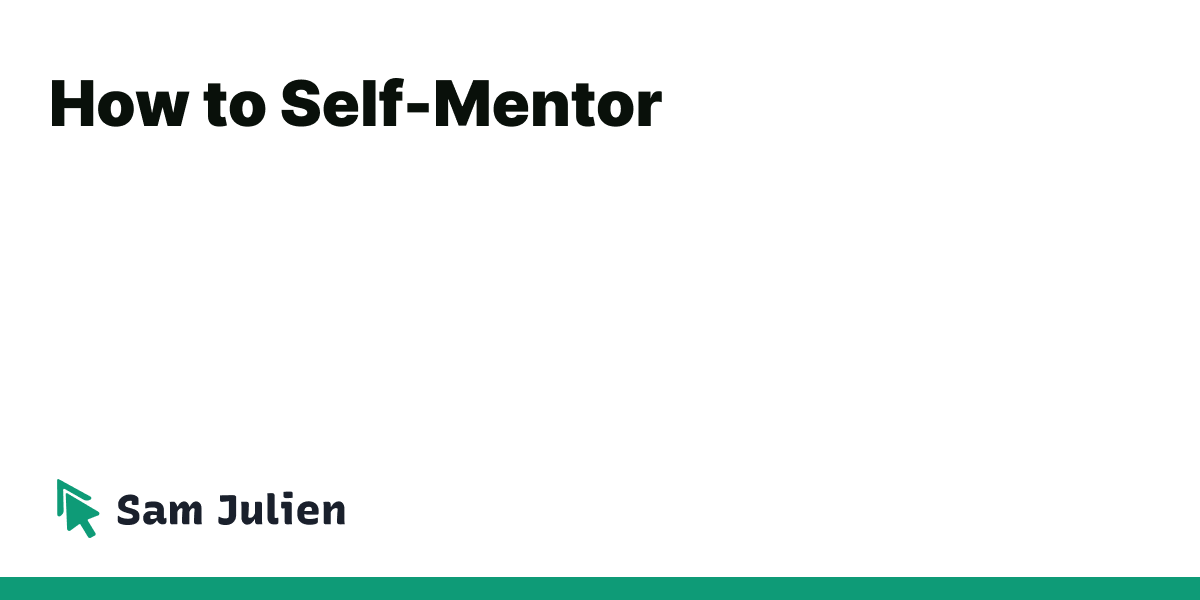A lot of people will tell you "You don't need a mentor!" but won't actually tell you *how* you can effectively self-mentor.
Let's talk about why we want a mentor and how to crowdsource mentorship.
First, why do we want a mentor?
Let's talk about why we want a mentor and how to crowdsource mentorship.

First, why do we want a mentor?
We want:
 Direction: Tell me what to learn & what not to worry about
Direction: Tell me what to learn & what not to worry about
 Quality Control: Check my code quality & teach best practices
Quality Control: Check my code quality & teach best practices
 Accountability: Keep me working towards goals
Accountability: Keep me working towards goals
 Encouragement: Motivate me when I'm feeling down
Encouragement: Motivate me when I'm feeling down
We need substitutes in all 4 areas.
 Direction: Tell me what to learn & what not to worry about
Direction: Tell me what to learn & what not to worry about Quality Control: Check my code quality & teach best practices
Quality Control: Check my code quality & teach best practices Accountability: Keep me working towards goals
Accountability: Keep me working towards goals Encouragement: Motivate me when I'm feeling down
Encouragement: Motivate me when I'm feeling downWe need substitutes in all 4 areas.
 Direction
Direction1. If you have a dev job & boss, a lot of your direction is set. We often don't feel this is enough because it doesn't feel cool or exciting if we're working on legacy code. Truthfully, you are making progress just by racking up experience points!
2. What are people you admire & respect doing? I have a handful of people I follow as "trendsetters" because I trust their judgment. They're not jumping around between flash-in-the-pan technologies, so I can tell when something is worth my attention.
3. If someone is willing to pay you to code in or teach a technology, that's a good sign you're doing something right. Lots of surprises here as not everything needs to be new & shiny.
 Quality Control
Quality Control1. Many coding tutorial websites have built-in IDEs that run tests & check your work. Very helpful for knowing if your code runs & is syntactically correct.
2. To learn patterns & best practices:
a. Conference talks
b. Courses, articles, & training from high-quality sources
c. Docs. These are best practices by example!
a. Conference talks
b. Courses, articles, & training from high-quality sources
c. Docs. These are best practices by example!
 Accountability
Accountability1. Individual accountability: find a friend & commit to something. Start with short small commitments like a small project in a week. It's like a gym buddy, but for code! @Twitch is great for this!
2. Learning in public: Writing what you're learning about doubles as a means of accountability. Even more true if you commit to a regular cadence. Give yourself an end goal like writing every week for 4 weeks. You can always start another round! Try @hashnode if you need a blog.
3. Group challenges/learning cohorts: There are groups challenges that you can get involved with like #100DaysOfCode and study groups like #JavaScript30. You can start a "learning cohort," which are like book clubs for coding.
4. Paying someone for an hour: This isn't always an option since it costs $, but sometimes the shortest path between 2 points is to just pay someone to help. Paying someone to pair with you for an hour on something might save you tens or hundreds of hours.
 Encouragement
EncouragementDon't neglect this part of the process. We all need support! Some ideas on where to go:
1. Discord servers. I've been so happy to be part of different Discord groups. One that has been particularly welcoming is @CodeCafeOnline.
2. Slack channels. Groups like @CodeNewbies have dedicated Slack channels that can be a great motivation boost.
3. My email list. No really, feel free to write me whenever you need a boost.
3. My email list. No really, feel free to write me whenever you need a boost.
If you feel overwhelmed, remember: building a system like this doesn't happen overnight. Take it a step at a time. Pick the area where you are feeling the most pain and work at it. Don't get discouraged if the first attempt doesn't work. It's not a failure, it's a test!
I hope you found this thread helpful! It's a shorter version of an issue of my newsletter Developer Microskills. Each week I send practical, actionable ways to improve as a developer and developer advocate. You can sign up at http://samjulien.com and say hello!

 Read on Twitter
Read on Twitter


